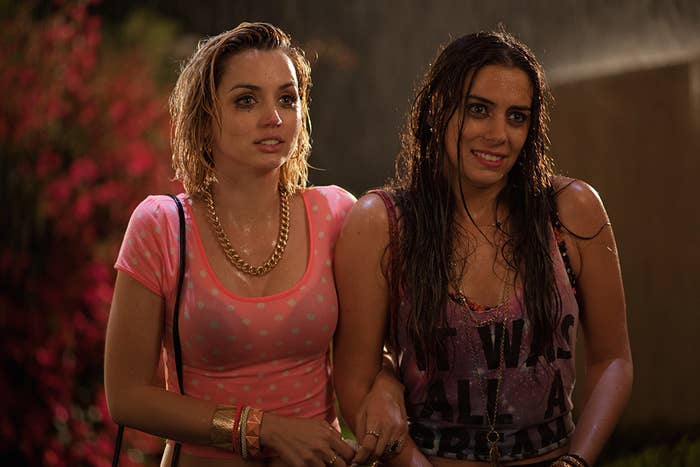
PARK CITY, Utah — Eli Roth knows his latest movie Knock Knock is going to provoke conversation — and he wouldn't have it any other way. The latest from the Hostel writer-director, which premiered Friday at the Sundance Film Festival and was later bought by Lionsgate for a reported $2.5 million, plays out like a straight man's fantasy turned nightmare. The movie centers on family man Evan Webber (Keanu Reeves), who is home alone for the weekend when two gorgeous women (Lorenza Izzo and Ana de Armas) show up at his door, dripping wet from the rain, unsubtly throwing themselves at their host. Once Evan gives into temptation, however, the women reveal their true (very unstable) colors, and Knock Knock descends into an off-the-wall psychological thriller.
As was the case with Gone Girl — and you may want to stop reading now if you still haven't seen that film or read Gillian Flynn's novel on which it is based — Knock Knock plays with the trope of the malevolent woman who uses sex as a weapon against men she feels are deserving of punishment. It's an archaic archetype that both films attempt to subvert, and whether they succeed or not is up for the audience to decide. But those who feel these female characters are underdeveloped can easily give the films a misogynist reading. Just as Gone Girl was praised by some as a progressive satire and decried as anti-feminist tripe by others, Knock Knock has been inciting a similar debate at Sundance.
But Roth is no stranger to controversy, and he did not shy away from discussing the inevitable feminist critique of Knock Knock when he sat down with BuzzFeed News for an interview at the Canon Creative Space in Park City. The director, who co-wrote Knock Knock with Nicolás López and Guillermo Amoedo, also talked about his departure from gorier past works, and why he's determined to make movies that start a conversation.
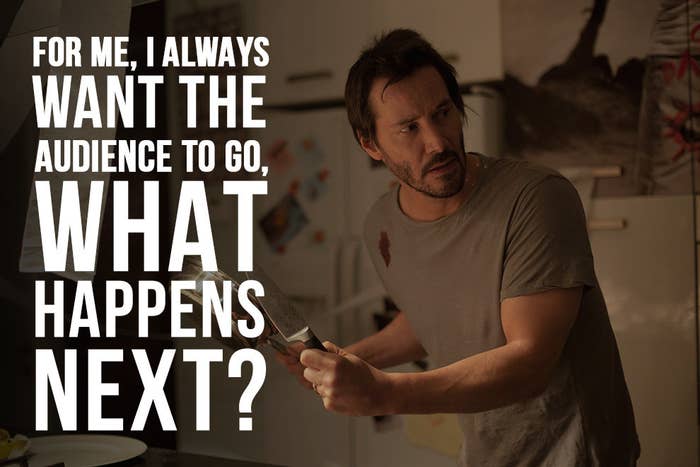
Knock Knock feels substantially different from your past work.
Eli Roth: Well, sure. It's interesting 'cause every time I make a movie, I feel that one is completely different from the next. When I made Hostel, I was like, it's totally different from Cabin Fever. Cabin Fever was funny. It was an homage. Hostel's dark and straight, and Hostel II, I thought it was more operatic and stylish. And then Green Inferno is lush and green and in the jungle, in the Amazon. It looks more like an adventure movie.
But yet, in a strange way, they're all the same film, because it's clearly this theme of privileged Americans that want to go out into the world — one is for fun and escape and sex, another is for sex tourism and adventure and life experiences at the expense of others, and the other one is to save the Amazon but really for their own vanity and everyone pays the price.
I wanted to make a film that looked and felt very different from my other movies, that was not a horror movie, that really was like a '90s thriller, like Fatal Attraction or Basic Instinct — a charged sexual-tension thriller. And something that looked and felt like an old Roman Polanski movie — either Rosemary's Baby or Death and the Maiden was a very big influence. I wanted something that really was like a slow burn tense movie that just kept the audience guessing and questioning, and really felt more like a chess game, and that doesn't have the blood and gore. We used the destruction of art to substitute for the destruction of body parts.
There is a lot of psychological torture in the film, but there's very little physical violence. Why did you decide to hold back on the gore and go that route?
ER: Every movie has its own level of gore that's appropriate, and that is up to the director to decide how much is in or out. But if you're making The Green Inferno and they're getting chopped up and eaten in the jungle, it's a very visceral movie. And in Hostel, that's what people are paying for. The audience is complicit in the violence. They're paying to watch kids in the movie get killed in the same way that people are paying to kill within the movie. But that's not what this movie is about. As the director, it's my job to look at it and go, What does the story require? How much is necessary? How much is gratuitous? For me, I always want the audience to go, What happens next?
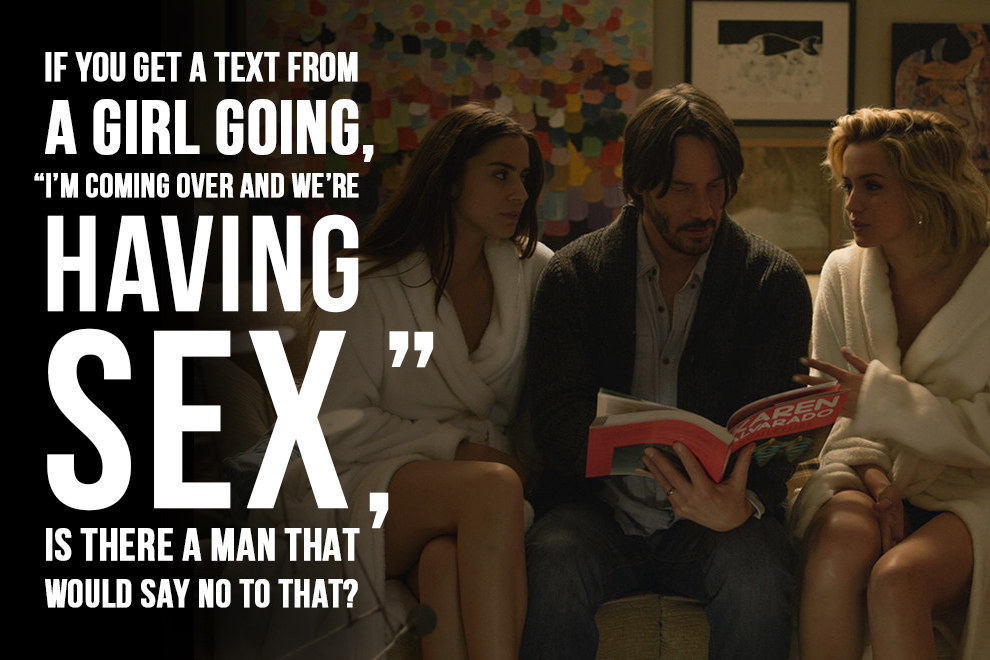
Knock Knock is a movie where a man is punished for cheating. But the cheating is so fraught, because it's not something he was looking for. It's really thrust on him.
ER: It's the "free pizza" theory, which we talk about. When me and Nicolás López were writing it, he goes, "Would any guy ever say no to a free pizza?" If you get a text from a girl going, "I'm coming over and we're having sex," is there a man that would say no to that? Some people would say yes, and others would say no. That's why he says, "It's like free pizza just shows up at my door. What am I supposed to do? Say no? Can you blame me?"
But if you look back, there's clearly tension in the marriage. He's not having sex with the wife. And it's Father's Day, everything in that house is all about her. He's trying to be the supportive husband, but there's resentment, because she has the gallery show, she has her statues everywhere, the walls are covered in her artwork. The mother dominates everything.
He's a man that's been castrated in a strange way and emasculated, and instead of confronting his wife and going, "You know what? This is fucked up. You guys should be staying here with me," he doesn't. He takes it in and buries it. And then these other girls come out and they go, "Hey, you are hot" … They're just tantalizing him. And he goes, Yeah, you know what? I'm a man. I am a man. I'm not just here like the dad. I'm a man. I'm a sexual being, and that's OK. My wife doesn't want to have sex with me. My kids were making fun of me. I'm gonna do this. There's nothing wrong with that. That for me is interesting — the way that people don't confront what's really bothering them, and that if you don't do that, and if you don't say what's wrong in the relationship, it's gonna come out in a crazy way.
But the cheating is so contentious. I mean, they're really pushing him. He's telling them to stop.
ER: Well, he does it, though. We talked about that. If you notice, Evan's mouth says no, but his feet say yes … In his own moral compass, if he says, "No, no, no, don't, don't, don't," then he sort of says, Well, it wasn't my fault. They insisted. They did this to me. And then of course it all spirals and gets done in a much worse way later on. But Evan is completely complicit in it, and he makes the move to kiss her when the phone rings. He drops his hand like he's gonna lean in and kiss her.
We always made sure in every moment that they were simply leaving the cheese and he was taking it. They're leading him in. They never force him into something. He always makes the choice. His mouth always says no, but his actions say otherwise.
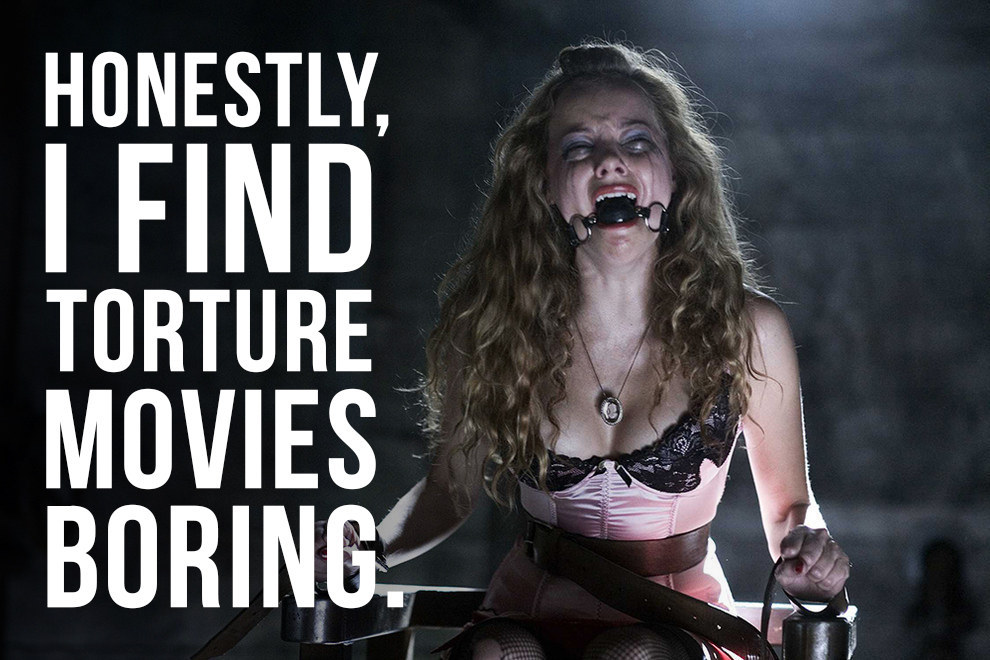
Going back to what you said about keeping the torture psychological in this film, has your perspective on portraying torture changed since you made the Hostel movies? There was an influx of more graphic violence and torture in American horror films after that. Has that changed what you want to do in your films?
ER: I do what I do, and I feel very lucky that my films have done well enough for me to get to continue to do them. But the truth is, I don't want to repeat myself. And honestly, I find torture movies boring. And I feel like when I did Hostel, it was very groundbreaking. People said, "This isn't mainstream subject matter," and it became mainstream. It was actually not gonna be released. We started making it with Sony, they brought in Lionsgate to release it, and Lionsgate was gonna go straight to video with it because they were too nervous about the subject matter. Then we got Quentin [Tarantino] involved and they said, "OK, let's put it out." And it wound up being a huge hit for them.
I just felt that's what people needed to see at that moment, because that's what was going on in Bush America and all the torture that we were doing. We sort of felt this feeling that we could go into anywhere, into any country, and take them over. We were torturing people and creating whatever rules we wanted. It's very scary.
And the power of the American dollar — what happens when there's someone who doesn't care about your money, that just wants the feeling of just knowing what it's like to kill you? And paying to kill you? This new level of — these guys are using the girls as hookers, and they become the prostitutes essentially.
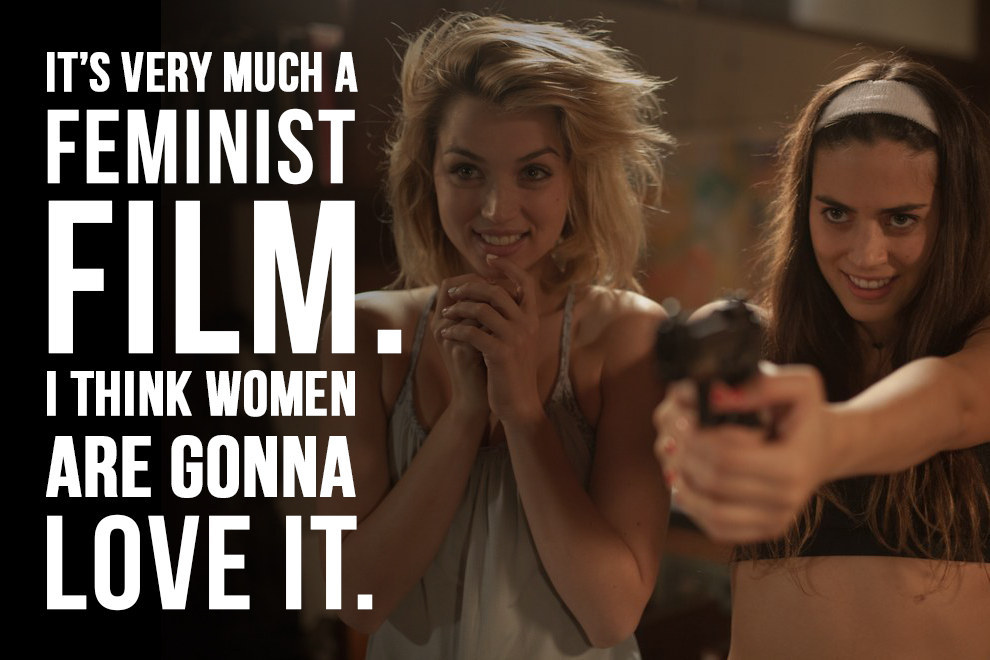
Let's get into it. I once had an argument with a friend because I said that Hostel: Part II is one of my favorite films, and she said that made me a bad feminist. I often find myself having this conversation about feminism and horror. As a horror filmmaker, do you consider yourself a feminist, and is that a label you would apply to your work?
ER: I don't even think of myself as a horror filmmaker. I just think of myself as a storyteller. I think that it's my job as a storyteller to present the story fairly from all sides, and to treat female characters and male characters the same and not favor one or the other, but to try to make them all 360 degrees. There's a great feminist horror magazine called Axe Wound, and they love Hostel II. Diablo Cody for her birthday party in 2007 went with her friends to see Hostel II, and she thought it was a feminist masterpiece. Everyone's entitled to their opinion.
With Knock Knock, I think it's very much a feminist film. I think women are gonna love it … I liked these [female] characters that, something terrible has happened to them, and they believe that all men are the same, and this is just fucking bullshit. You take the guy with the wife and the kids, the perfect house, the two cars in the garage, and you put the pizza in front of them, they're gonna take it. 'Cause no matter how much you window-dress a man like that, deep down, they're all the same. And I really see it from their point of view. But I also see it from Evan's point of view too. Here's a guy who doesn't feel like a sexual being anymore. All the things he thinks are cool — his hair, his records — his family kind of dismisses.
I like making movies that have those complex layers and movies that people discuss. The fact that your friend hated Hostel II and the fact that you loved it, but that you could both discuss it a year later, that's the kind of movie I'm interested in making. I want to make something that is provocative. It's not gonna please everyone, but 10 years from now, you could still show it to a group of friends and it's gonna get a reaction, one way or the other.
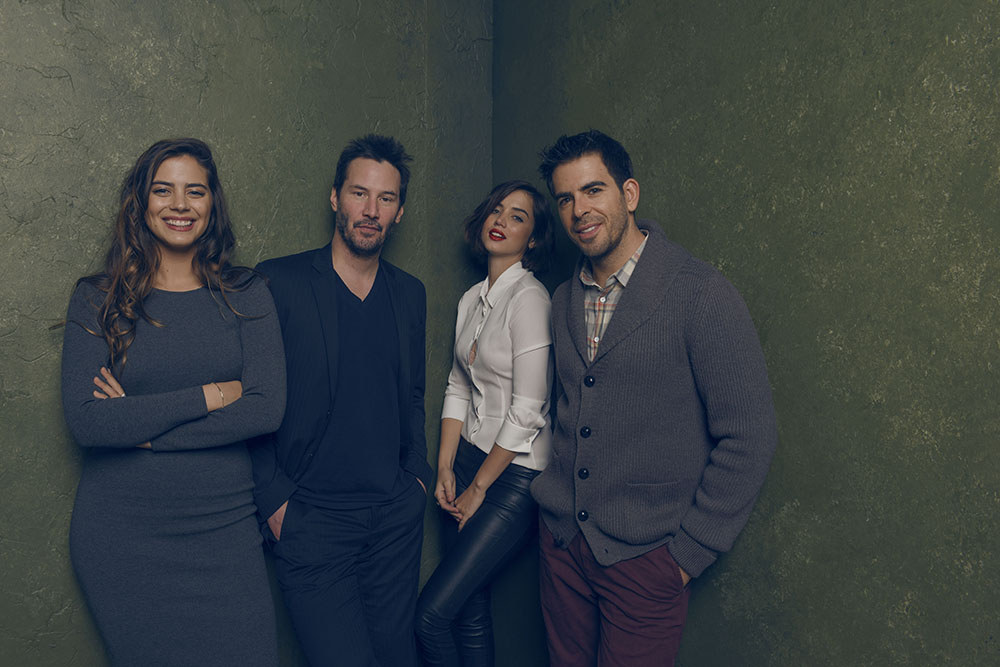
Knock Knock made me think of Gone Girl in that some people believe that movie is very feminist, and others think it's completely anti-feminist. Men's rights activists could look at the characters in Knock Knock, like Amy in Gone Girl, and see that as a justification of their belief that this is how women are. They seduce a man to entrap him and punish him. How do you respond to that?
ER: Whether people react one way or the other, you can't really control that. It's my job to make something that provokes thought and provokes discussion. And I want to tell something that affects people and makes them think of situations in their own life. I want people watching the movie to think about the situation where you've had someone in your life that got very close to you, that you let inside, and you overlooked all the obvious warning signs that you deep down knew it probably wasn't a good idea. You let them get close to you, and it actually can destroy you.
Regardless of interpretation, though, you obviously have an intention when you're writing. You said that Knock Knock is a feminist film, so is that a label you accept?
ER: I would accept it, absolutely. I wouldn't sell it as a feminist film. I wouldn't say, "Feminists should see Knock Knock." I just look at it as a film. And I think that I treat all the characters fairly, and that everyone gets their say, and that everyone's point of view is represented and well thought out. People can decide which side to take.
This interview has been edited and condensed.

